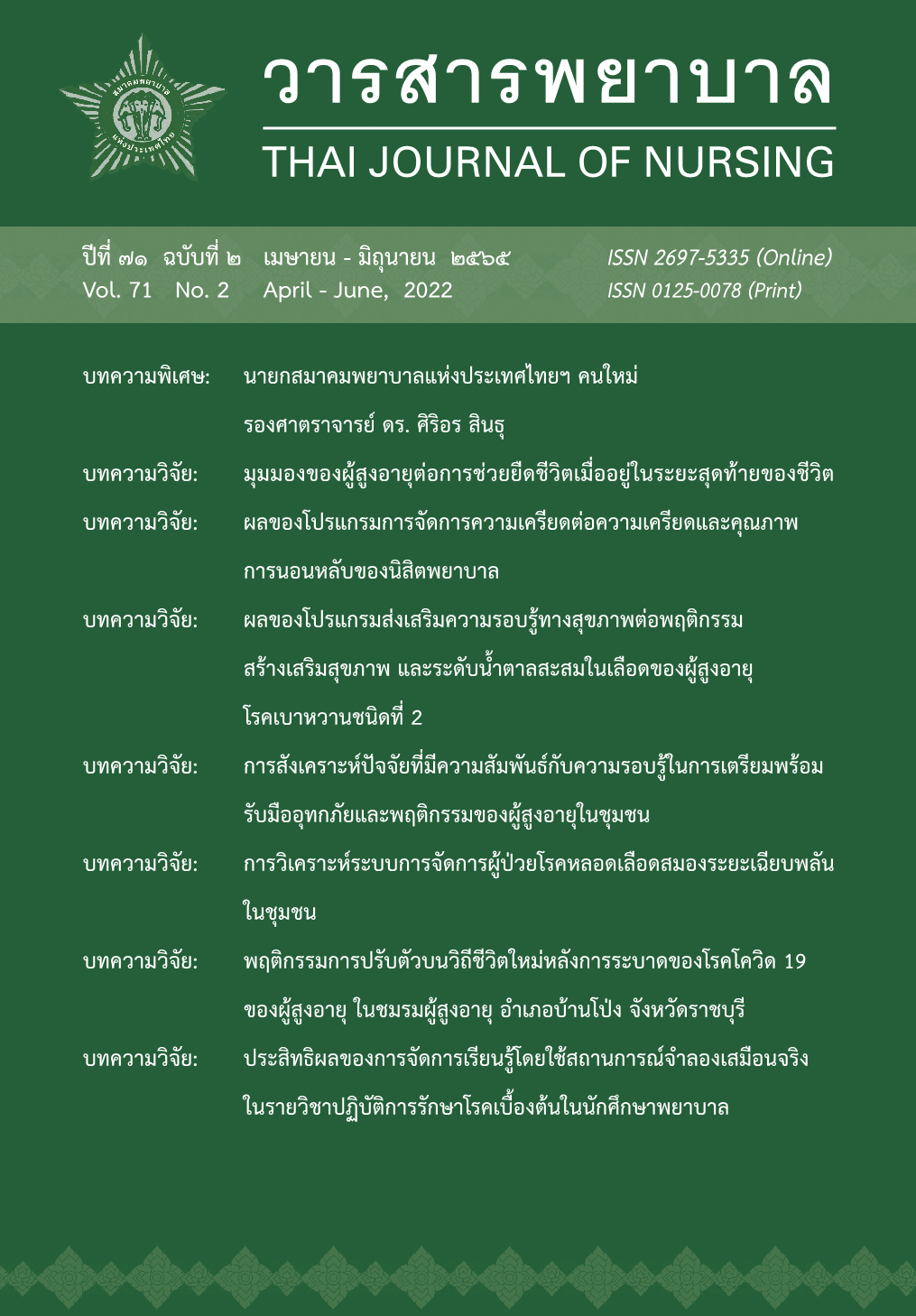พฤติกรรมการปรับตัวบนวิถีชีวิตใหม่หลังการระบาดของโรคโควิด 19 ของผู้สูงอายุ ในชมรมผู้สูงอายุ อำเภอบ้านโป่ง จังหวัดราชบุรี
Main Article Content
บทคัดย่อ
การวิจัยครั้งนี้มีวัตถุประสงค์เพื่อศึกษาพฤติกรรมการปรับตัวบนวิถีชีวิตใหม่ และเปรียบเทียบพฤติกรรมการปรับตัวบนวิถีชีวิตใหม่ หลังการระบาดของโรคโควิด 19 ในผู้สูงอายุที่มีปัจจัยส่วนบุคคลแตกต่างกัน โดยใช้กรอบแนวคิดตามแบบจำลองการปรับตัวของรอย กลุ่มตัวอย่าง จำนวน 120 คน เลือกแบบเจาะจง โดย เป็นผู้สูงอายุที่เข้าร่วมชมรมผู้สูงอายุตำบลลาดบัวขาว อำเภอบ้านโป่ง จังหวัดราชบุรี เครื่องมือวิจัย ได้แก่ 1) แบบสอบถามข้อมูลส่วนบุคคล ครอบคลุมลักษณะชุมชน รายได้ โรคประจำตัว และการรับรู้ข่าวสารของโรคโควิด 19 และ 2) แบบประเมินพฤติกรรมการปรับตัวบนวิถีชีวิตใหม่ ประกอบด้วยการปรับตัวด้านร่างกาย ด้านอัตมโนทัศน์ ด้านบทบาทหน้าที่ และด้านการพึ่งพาอาศัย หาค่าดัชนีความตรงเชิงเนื้อหาได้เท่ากับ 0.89 ค่าสัมประสิทธิ์ความเที่ยงได้เท่ากับ 0.82 วิเคราะห์ข้อมูลโดยใช้สถิติเชิงบรรยาย และการทดสอบที ผลการวิจัย พบว่า ผู้สูงอายุมีพฤติกรรมการปรับตัวบนวิถีชีวิตใหม่อยู่ในระดับดีมาก และผู้ที่อยู่ในชุมชนเมืองมีพฤติกรรมการปรับตัวได้ดีกว่าผู้ที่อยู่ในชุมชนชนบท
Article Details

อนุญาตภายใต้เงื่อนไข Creative Commons Attribution-NonCommercial-NoDerivatives 4.0 International License.
เอกสารอ้างอิง
กระทรวงสาธารณสุข. (2563). คู่มือการปฏิบัติตามมาตรการผ่อนปรนกิจการและกิจกรรมเพื่อ
ป้องกันการแพร่ระบาดของโรคโควิด 19 สำหรับประเภทกิจการและกิจกรรม กลุ่มที่ 2.
นนทบุรี. อักษรกราฟิคแอนด์ดีไซน์.
กระทรวงสาธารณสุข กรมควบคุมโรค. (2563). รายงานสถานการณ์ โควิด 19. สืบค้นเมื่อ 15
กันยายน 2563, จาก https://covid19.ddc.moph.go.th/
ทศพร คำผลศิริ. (2560). การพยาบาลผู้สูงอายุ เล่ม 1 (พิมพ์ครั้งที่ 1). เชียงใหม่: โครงการ
ตำรา คณะพยาบาลศาสตร์ มหาวิทยาลัยเชียงใหม่.
พงษ์ศิริ ปรารถนาดี. (2563). ผู้สูงอายุควรปรับตัวอย่างไรใน COVID-19. สืบค้นเมื่อ 23
ตุลาคม 2563, จาก https://www.thaihealth.or.th/Content/51787-
%20.html
พิมพิสุทธิ์ บัวแก้ว, และรติพร ถึงฝั่ง. (2559). การดูแลสุขภาพและภาวะสุขภาพของผู้สูงอายุ
ไทย. วารสารสมาคมนักวิจัย, 21(2), 94-109.
มนพัทธ์ อารัมภ์วิโรจน์, อนันต์ ไชยกุลวัฒนา, นิตยา สุวรรณเพชร, และยมนา ชนะนิล.
(2554). การปรับตัวและการสนับสนุนด้านสังคมของผู้สูงอายุ ในเขตเทศบาลนคร
อุบลราชธานี. วารสารศรีนครินทร์เวชสาร, 26(3), 196-206.
มูลนิธิสถาบันวิจัยและพัฒนาผู้สูงอายุไทย. (2563). สถานการณ์ผู้สูงอายุไทย พ.ศ. 2563.
กรุงเทพมหานคร: อมรินทร์พริ้นติ้ง แอนด์พับลิชชิ่ง.
ศูนย์ข้อมูล COVID-19. (2564). สถานการณ์โรคติดเชื้อไวรัสโคโรนา 2019 (COVID-19)
ทั่วโลก. สืบค้นเมื่อ 12 กันยายน 2564, จาก http://www.prd.go.th/
อภินันทน์ สนน้อย, ปิยาภรณ์ ศิริภานุมาศ, และสุรชัย ปิยานุกูล. (2559). รูปแบบการพัฒนา
คุณภาพชีวิตผู้สูงอายุในจังหวัดบุรีรัมย์. วารสารวิชาการมหาวิทยาลัยราชภัฏบุรีรัมย์,
(2), 153-169.
องค์การบริหารส่วนตำบลลาดบัวขาว. (2563). ข้อมูลพื้นฐานของตำบลลาดบัวขาว. สืบค้น
เมื่อ 15 กันยายน 2563, จาก http://www.ladbuakhaw.go.th/site/
Hair, J. F., Black, W. C., Babin, B. J., & Anderson, R. E. (2010). Multivariate data
analysis:A global perspective (7thed.). New Jersey: Pearson Prentice Hall.
Roy, C., & Andrews, H. (2009). The Roy adaptation model (3rd ed.). New
Jersey: Upper Saddle River, Pearson Education.


